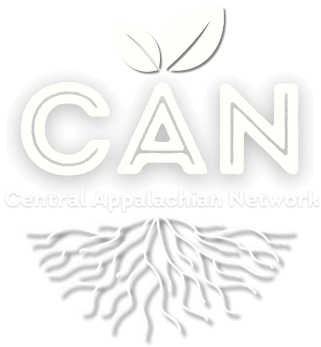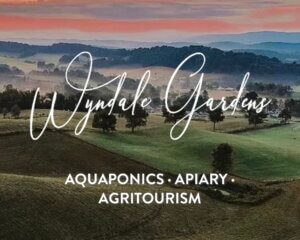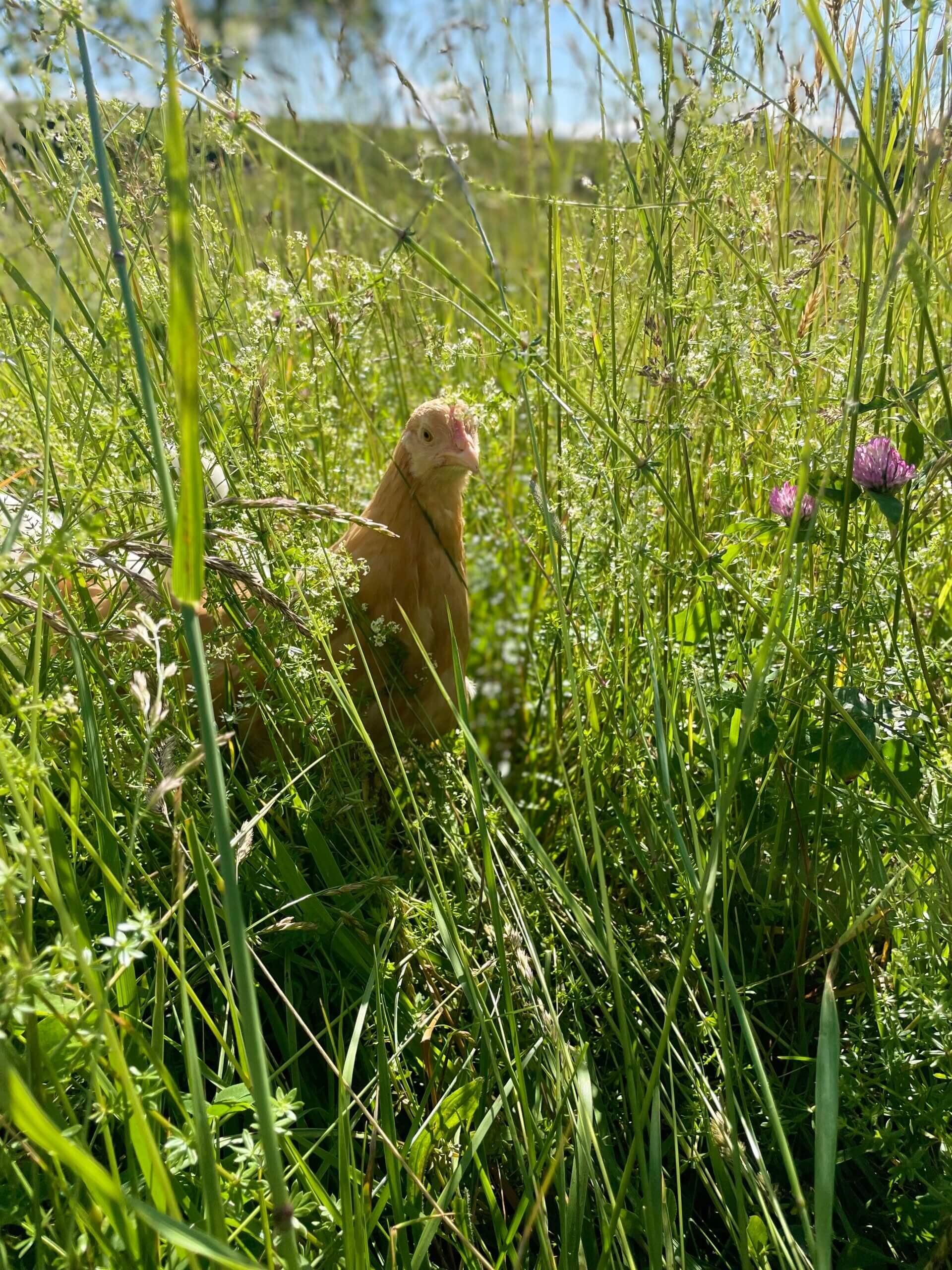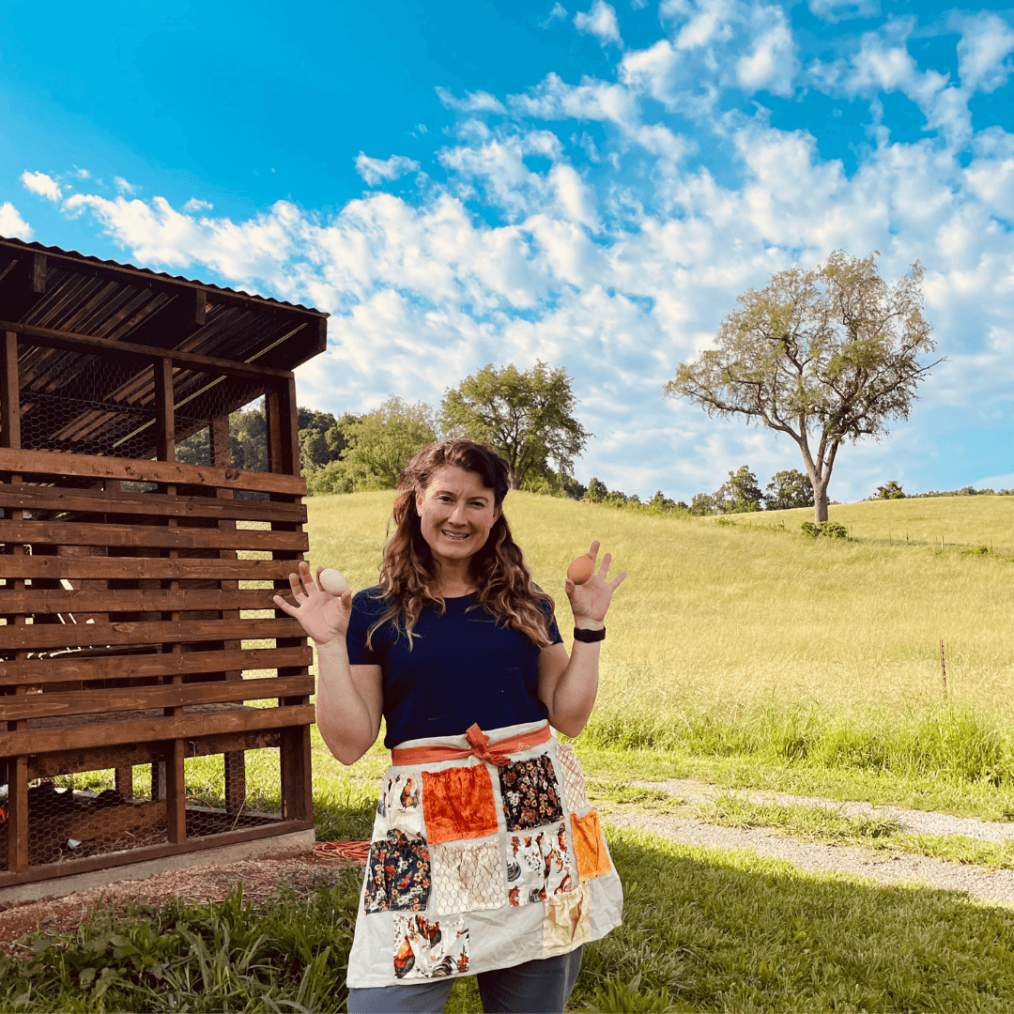
Wyndale Gardens – Feeding Schools & Community
“The genesis of our story is like many people’s, which was the start of the pandemic.”
Rebecca and Scott Ramsey were located in Colorado where they were experiencing food shortages in the midst of the pandemic. When they started to see the grocery store shelves become empty with two children at home, it made them begin to reconsider and evaluate their food sources. Neither Becky nor Scott had any agricultural backgrounds and because they were renting at the time, they chose to start experimenting with hydroponics. Hydroponics is a method of growing plants without soil and using a water-based nutrient solution. Rebecca was realizing that she couldn’t get fully onboard with their system requiring the use of synthetic fertilizers. They then stumbled upon aquaponics where Scott converted their hydroponic lettuce tower by adding goldfish to the bottom and clay pebbles along with red worms to the top.
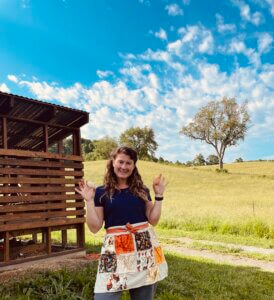
They then went on a road trip across the country and stayed at family farms, wineries, orchards, and breweries to listen to farmers’ stories. They learned how the farmers had to grow, change, and adapt. From there Becky and Scott were all in. In April of 2022 after their oldest was off to college, they decided to buy a 34 acre farm in Abingdon, VA where Scott was born.
Reflecting on the pandemic and losing loved ones, it made them think about what is life and living?
“It really is about having experiences together and that the best way of doing that is through food and fellowship.”
Wyndale Gardens (WG) is based around sustainability and growing partnerships. They have partnered with Abingdon Olive Oil Company, local school districts and grocery stores. Their first year was about building a system and getting a product to the market. WG grew many different things at first to see where they could “fit” into the agricultural world. Everyone was impressed with the products they put out. They became confident that they didn’t have to spray with any insecticides or fungicides and were creating a system that was producing nutrient dense foods. That got Rebecca thinking about students. One of the major issues she has seen over her 20 year teaching career is school nutrition.
“Eating habits lead to health problems. which lead to learning problems, which leads to emotional disruptions. It’s all very connected and has become a central driving point of our farm.”
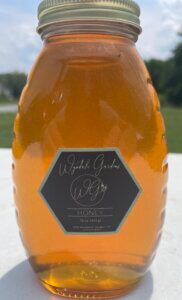
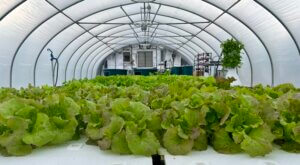
They decided to quit going the CSA route and switched to a wholesale market approach. They switched to mono cropping and are doing a living butter lettuce which is their major crop. They are serving four school districts, which is about 30 schools and 10,000 meals.
“Kids are loving it and eating it. It looks good and tastes good and has the same nutritional content as Romaine Lettuce.”
Their farm is a meld of learning, science, and technology. Now that they have solidified their wholesale market and developed three greenhouses, they are producing about 5,000 heads of lettuce per month. Their next phase is a multipurpose agricultural building. Part of the building will have an educational flex space which will be the home base for Wyndale Garden’s Pre-K Academy, an agricultural preschool.
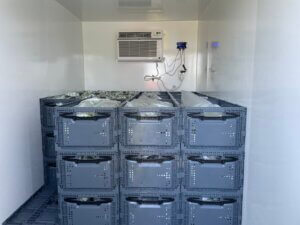
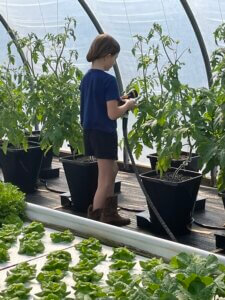
“I think unfortunately we’ve built a society where parents are very limited in their ability to provide experiences due to work commitments and having to make a way in this world. Children aren’t growing up the way that I did or maybe some of you did. We were in the woods, we were building, we were barefoot… I think that is something that our youngest learners are missing. I think that the best way to learn is through experiences.”
“You can include academics and have the majority of your program be outdoors. Growing the plants and then eating the plants. Taking care of the animals and then learning how the animals become our food. All the while, learning a deep respect for the cycles of life and living, which I think will give them purpose. Hopefully, when they get older they are going to remember that pre-k experience and go into agriculture.”
The number one industry in Washington Country, VA is agriculture and the median age of farmers is 65 years old.
“I don’t see a sustainable way to move [farming] forward unless you convince younger people that even though it can be a difficult business with many varying factors, you can still support a family and it is worthwhile”
Q&A
The procurement angle has been a challenge with our food hub being able to supply the school on their schedule that fits with our trucking schedule. We have found it is easier to connect schools to the farmers in their neighborhood directly and work on ways to facilitate that. So you have found that has been working for you?
The problem with a lot of the school programs, and I have been in the school system for a long time, is that you get someone who is very gung ho about an idea and they put a program in place but eventually that person is going to retire. And when they retire, they take all that leadership and passion with them and the program dies. We really thought about how you don’t want to partner with an educator in the building. You want to partner with a business because the business is going to be there and they are going to have employees and hopefully longevity. So if you are partnering with a business, my recommendation is that you have one person be the lead on it and that lead person does have to coordinate their farming cohorts. The school district needs one person to coordinate with and then work out some sort of delivery route and schedule. We actually had to change our whole fiscal year to follow a school calendar. So, I think that it is important to have a business connection, not just someone in the building because people get moved, and we don’t want a program to die just because we don’t have good leadership.
For the business partners within a school, how does that work for you?
So basically the school districts partnered with us, Wyndale Gardens, and then they gave us a list of what their cafeteria is required to serve – ’these are the types and amounts that we need, can you get this for us?’ – and then we have to find what we can supply and what we can’t supply. We also have to keep below a certain amount because then we have to compete with major distributors and there is just no way we can do that. Getting our local representatives to be on board with this as well so that they keep those farm to school dollars coming in order to help support communities. I think if they see the educational gains, if they see the employment gains, if you show them the business side of this they are going to be about it.
Does Virginia have any incentives or policies that encourage schools to be sourcing locally? In their food budget they will have a certain percentage allocated for local purchasing, correct?
Rebecca: Yes, this farm to school program is fairly new and it’s starting to trickle down to other states. I think what’s become a new major mission for both Scott and I is to help polish up this gem of farm to school. Make it something you can package and expand, and teach others how to do and make this the new norm. Small supply chains; locals supporting your schools; schools that are your community; and keeping everything in smaller webs.
Scott: A challenge we are running into as well is getting the farmers on board and convincing them that, ‘Hey, we can sell your product if you grow it for us,’ because we can’t grow it all obviously but the schools are willing to purchase that. They also get money through the Department of Defense. That gets put out for the public bid and contracted so we lose that money to some of our larger distributors. That food that is purchased has to be purchased “locally” but that could be within a three state area. So it is not truly local, but it is regionally supplied.
Rebecca: One of our other challenges is getting a farmer to commit to growing ‘this’, there is a lot of freedom in agriculture and artistic expression and they don’t want to commit to supplying ‘this’. They want the freedom to grow what they want to grow and experiment in their own ways.
